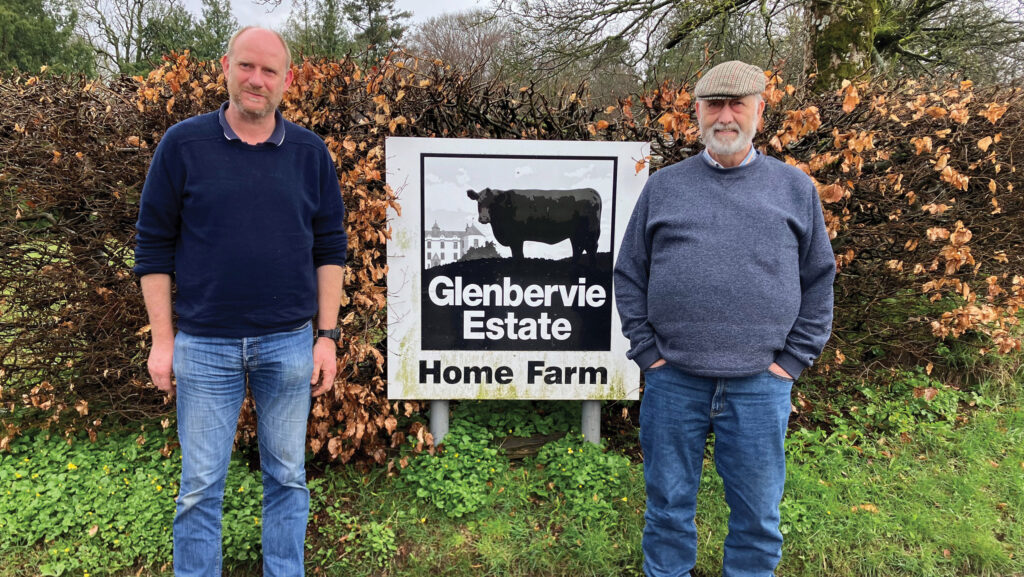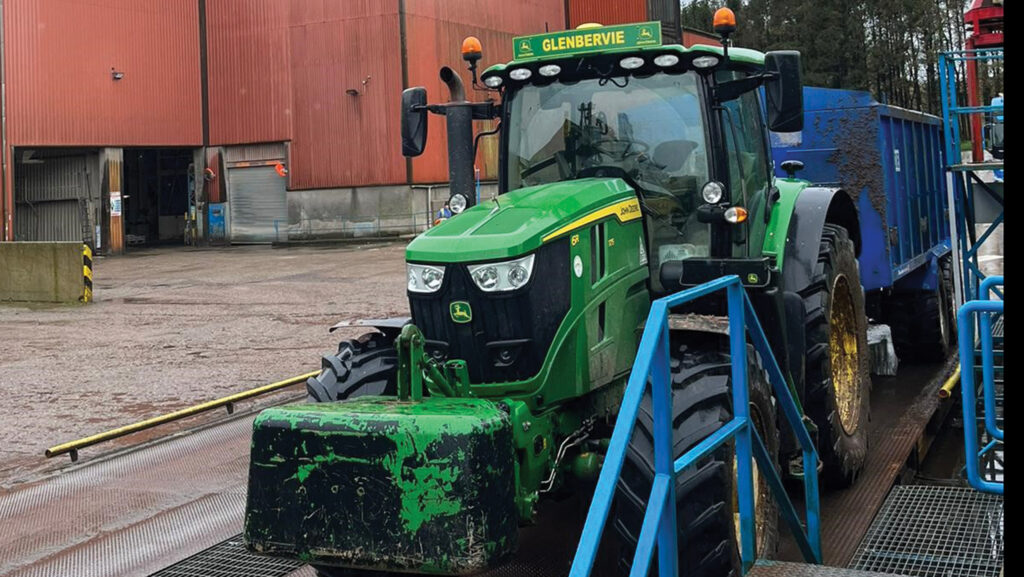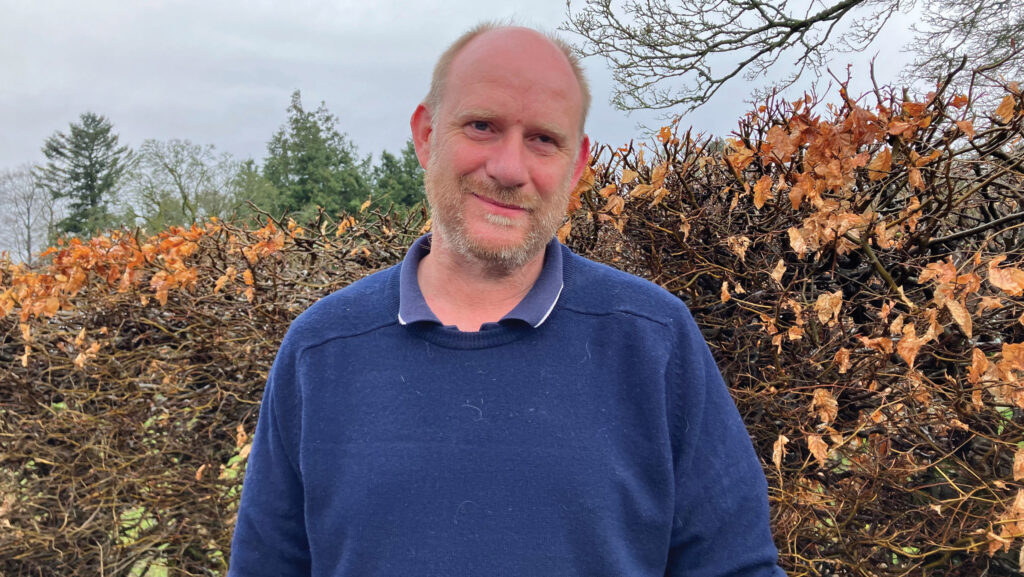Selling direct to local feed mill saves on storage and drying
 Charles Smith and John Lohoar © MAG/Emma Gillbard
Charles Smith and John Lohoar © MAG/Emma Gillbard A 30-year partnership with a local grain store and feed mill has proved to be a long-term sustainable grain marketing strategy for one farming estate on the east coast of Scotland.
Since 1992, the manager of Glenbervie Farm Estate, John Lohoar, has supplied local feed mill, East Coast Viners (ECV), with grain straight from the combine.
“We don’t have a grain dryer on the farm and we only have storage for about five days at the start of harvest. Having that facility to take grain direct off the farm saves time, space and haulage costs,” says John.
See also: Harvest 24: Impressive start to winter barley harvest at mixed family farm
The close partnership has saved the estate from forking out significant sums on grain storage and drying facilities.
Instead, the farm has worked with ECV to dry, store and market the feed grains, including any out-of-spec malt barley from the farm.
“After all, it’s costly to move a tonne of grain more than once, thereby creating significant savings for the business.
“The unique partnership works extremely well, and we’re lucky to have such a dependable market for our grain on the doorstep,” he says.
Located just two miles from the mill, Glenbervie Farm Estate was one of the first farmers to join the grain co-op when the storage facility opened in 1977.
A storage and drying fee is charged, but the flexibility to sell direct off the combine and without the need for hefty investment costs more than pays for itself, he says.
Grain can be sold at any point which is great for cash flow explains John, who often sells when purchasing fertiliser.
“We check the markets every day so we know when to approach ECV to lock in price for grain in store” he says.
Mill Supply
The majority of cereal crops grown at the 530ha estate are supplied to the mill, apart from malting barley which is destined for Simpsons Malt.
Spring barley is the mainstay of the rotation, which is established with the plough to get crops off to the best start and help culturally control weeds.
Grassland is incorporated into the arable land to provide a welcome fertility boost, with the addition of livestock helping combat potential grassweed problems.
“The grass and white clover leys are grown for four to five years followed by spring barley, with muck from the beef herd applied to arable land” says John.
“The farm is at equilibrium with cereals, cattle and straw. It is what makes Glenbervie Estate thrive, as we’re working the land in a sustainable way.”
The estate is also home to food manufacturing factory MacPhie, which has been on the estate for 51 years.
By-products from the factory are used as fertiliser and applied to the land on a rotational basis, acting as another useful soil conditioner.
The estate grows soft winter wheat varieties, mainly Stokes and Skyscraper, which proves simple to market for distilling and also via ECV.
However, John recalls the winter just gone to be the worst in 30 years, on top of the trying autumn to get seed in the ground.
“We had serious flooding in this area. Fields, bridges and farm buildings were swept away, and houses were flooded.
“We had to plough-in 10ha of winter wheat due to flooding – something I had not previously done in 30 of years farming at the Estate.”

© East Coast Viners
Livestock
On the beef side of the business, Glenbervie Estate buys back a range of feeds from ECV Animal Nutrition, milled from grain supplied by local farmers.
He begins by feeding a 17% protein calf creep to calves at grass from four to five months.
Over winter, animals are fattened on a 14% protein total mix ration made of home-grown barley, molasses and 34% protein wheat dark grains. Cattle achieve an impressive 1.8kg of liveweight gain a day.
Animals usually spend two summers on the grass and white clover leys, before being slaughtered to achieve 380kg carcass weights.
East Coast Viners history
ECV dates back to 1969 when three farming brothers Graham, Mike and John Forbes began growing and supplying vining peas for the human consumption market on Scotland’s east coast.
After initial success, the brothers scaled up the business and began renting land from Scottish farmers on a single season basis.
Today, the business grows 4,500ha of peas and beans, and runs seven viners 24 hours a day during the harvest season, from the end of June to late September.
They work with 200 farmers from Stonehaven to Auchterarder to produce peas through Dundee Cold Stores.
In 1976, Graham, Mike and John made the decision to establish a 24,000t grain storage co-op and drying facility for their own expanding farming operations, and to support local growers.
The site evolved to store a portion of the EU grain surpluses in the 1980s, and this assisted in the extension of the storage volume, which now peaks at 48,000t.
“At the time we were dealing with the EU grain mountains and a significant co-responsibility levy on all grain moving off the farm,” recalls John, who still runs the family business after the passing of his brothers.
“In 1990, we began milling some of the grain for pig feed and sold this to local farmers.
From here, the business evolved into a livestock feed mill and as this expanded, so too did the demand for professional livestock nutrition advice,” he says.
Both arms of the ECV operation – the pea vining and the grain storage and animal nutrition business – are now flourishing.
The feed mill now produces quality livestock feed to 4,000 customers from Caithness to the Scottish Borders, and employs over 60 members of staff.
A brand-new Tornum TK8-20 continual flow grain dryer, developed by a Swedish manufacturer, was installed at the Drumlithie site, and was fully operational for its first harvest in 2023.
A 3MW biomass boiler fuelled by locally sourced woodchip is used to power the grain dryer.
Supplemented with modulating top-up kerosine fired burners, it is capable of drying 80t of grain/hour, using 800-900t of woodchip annually.
“The grain will be dried using mainly biomass heat, topped up slightly using the modulating burners,” explains Operations Director at ECV, Ryan Daly.
“Along with the three 2.9MW turbines, we have on a local highpoint near the mill. This will allow us to continue to save on costs and reduce our reliance on fossil fuels.”
New manager to take the reins at Glenbervie
After more than 30 years as farm manager at Glenbervie Estate, John Lohoar is handing the reins over to Charles Smith, who is looking forward to taking over the business.
“We’ve got a great farming business at Glenbervie that I’m very much looking forward to drive onwards,” says Charles.
“With the close proximity of the farm to East Coast Viners and the relationship we have with them, we couldn’t ask for a better system,” he adds.

Charles Smith © MAG/Emma Gillbard

